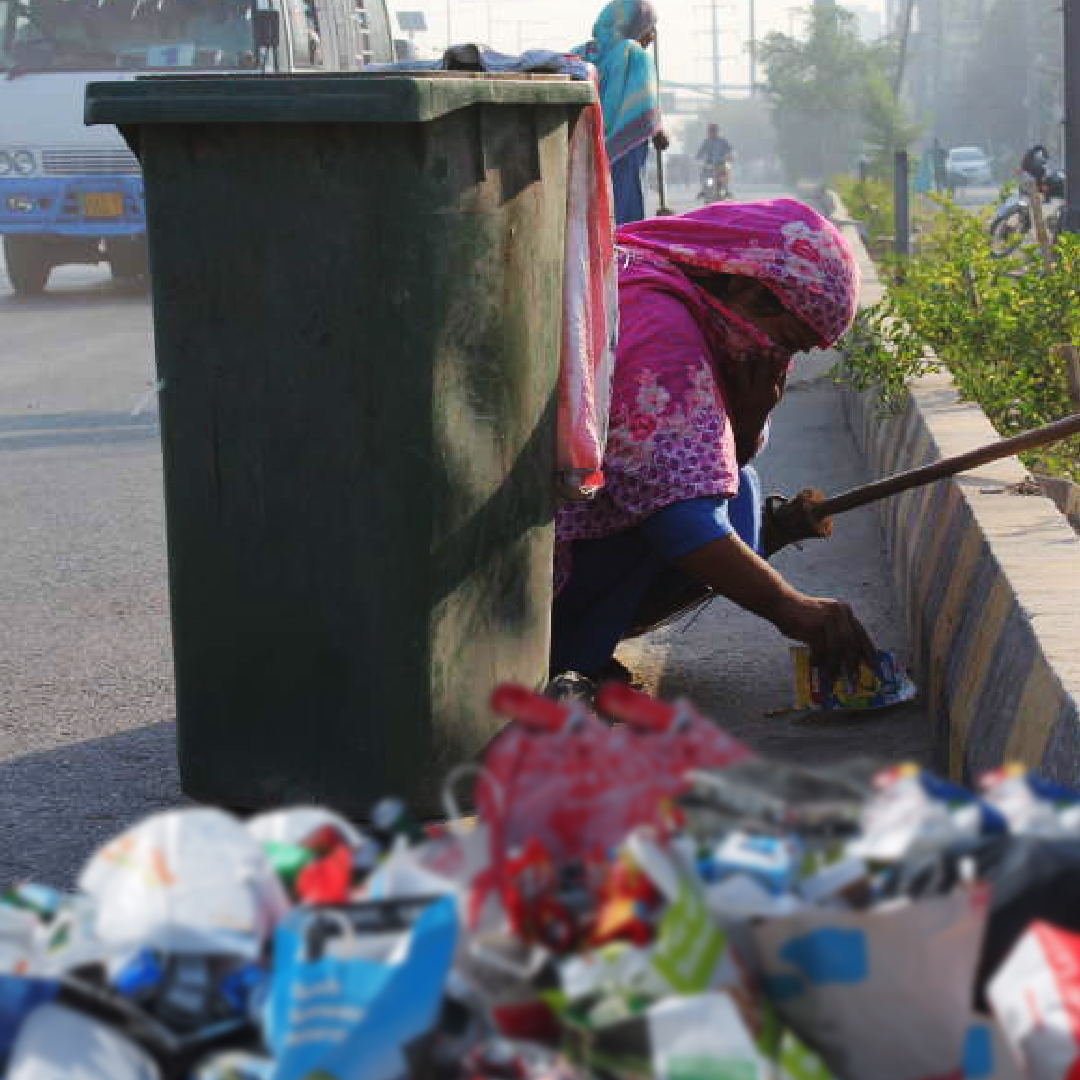Shakila Bibi (not a real name), a mother of five, wakes up before dawn to prepare breakfast for her family. After cleaning the house and giving medicine to her sick husband, a retired employee of the Lahore Waste Management Company (LWMC), she leaves for work at 5am.
Her travel is long and arduous, starting with the Lahore Orange Line Metro Train station of Yateem Khana on the Multan Road, followed by a motorcycle-rickshaw ride to ensure that she arrives at the workers’ assembly point on time.
She lives in a constant fear that if she is just five to 10 minutes late, her supervisor would mark her absent, resulting in a day’s salary deduction or her transfer to a post even farther from her home, worsening her commute.
After 11 years work with the LWMC, Shakila faces this anxiety everyday as she rises at the crack of dawn.
The LWMC has recruited about 7,000 women workers but there is a question mark over provision of essential facilities like transportation, healthcare, safety gear, sick leave, following rules for termination and a notice period.
When Lok Sujag spoke with the women workers, they shared that many of their hardships could be alleviated if the company provided them with necessary entitlements.
Suspension from service sans notice
A common issue that the women workers face is the suspension from service for months and even years without prior notice.
“The supervisors complain that we, the women workers, come to work late, do less work and get tired quickly. Even if women work more than the men, the supervisor would always say that a woman is doing less work and that should be immediately terminated,” complains a woman worker, highlighting the gender discrimination in the company.
She says once she got sick and sent a leave application to the supervisor but when she went back to work after getting well, she was told that she had been ‘temporarily disengaged’.
It has now been more than two years of her suspension from service while she has persistently asked the LWMC authorities to reinstate her but nobody pays heed to her pleas.
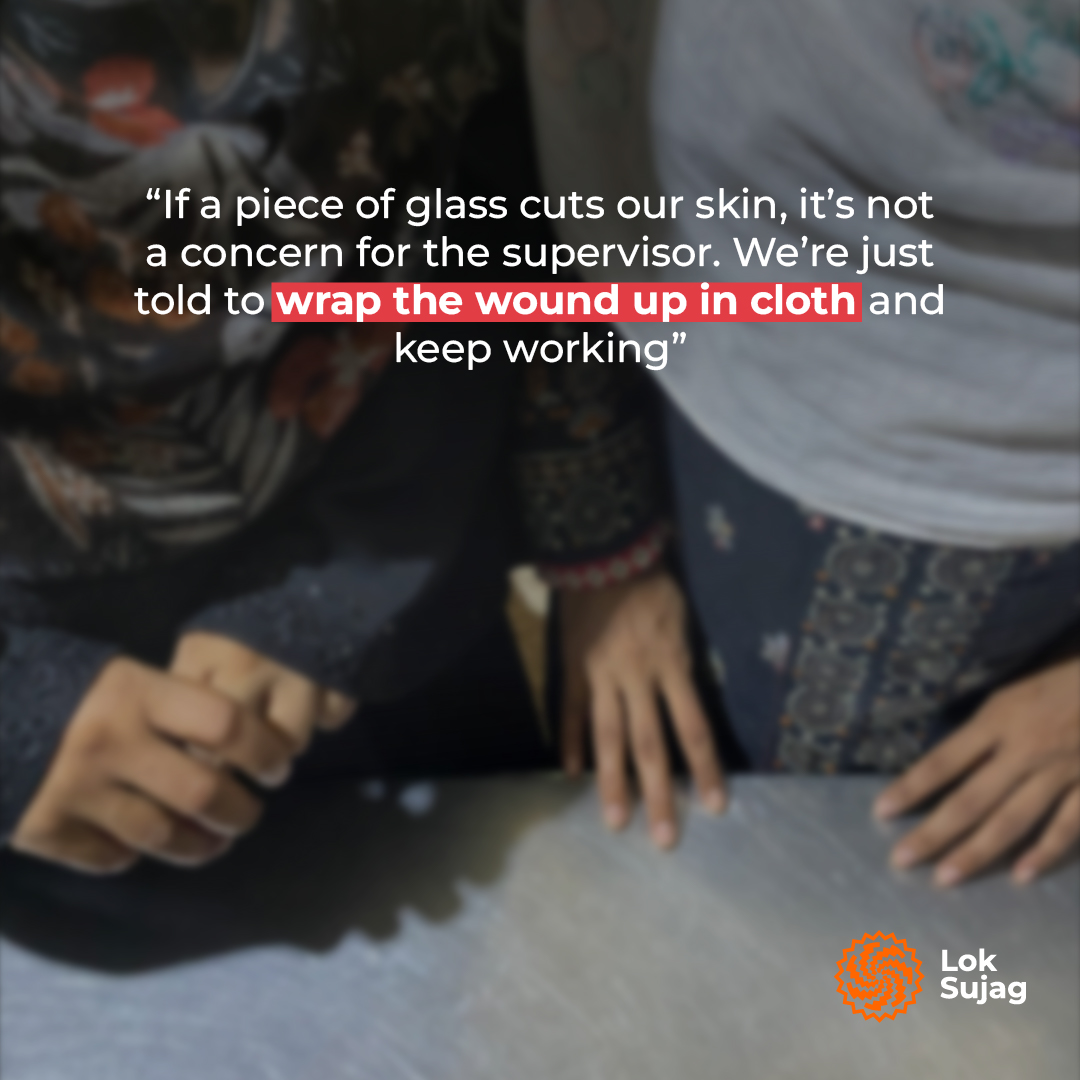
She is worried that she will not be able to sustain her household for a very long time because she is already in a lot of debt and her relationship with her family has become very fractious due to repeated calls for help.
The shopkeepers degrade her on a daily basis and persistently ask for their money for the groceries she had bought from them.
Another worker recalls an incident three years ago when she was sweeping a road and a speeding car collided with an LWMC truck. The truck ran over her, fracturing her left leg and she was unable to work for at least four months.
Despite the supervisor and zoning officer (ZO) being present at the scene of the accident as witnesses, they immediately claimed she was fine and had not suffered any injuries.
She attempted to return to work after a month, only to discover she had been terminated without notice or compensation. She has been unemployed for three years and she lost her husband nine months ago.
Her financial situation is so bad that her house’s ceiling is leaking and falling apart but she can’t afford to get it repaired.
LWMC spokesperson Umer Chaudhary explains that if a worker does not show up for 30 days and fails to inform their supervisor or zoning officer about their illness, they will be terminated.
However, the woman worker insisted that both the officials were witnesses to her accident yet she received no medical assistance and was still suspended.
The inhuman no leave policy
Saima was pregnant and she sought maternity leave in her ninth month of pregnancy but she was not only denied leave but was also immediately terminated from service.
“I kept telling the supervisors that I was experiencing contractions. Did they expect me to give birth on the road?”
She says she appealed to the LWMC to allow them leave without the threat of termination but to no avail.
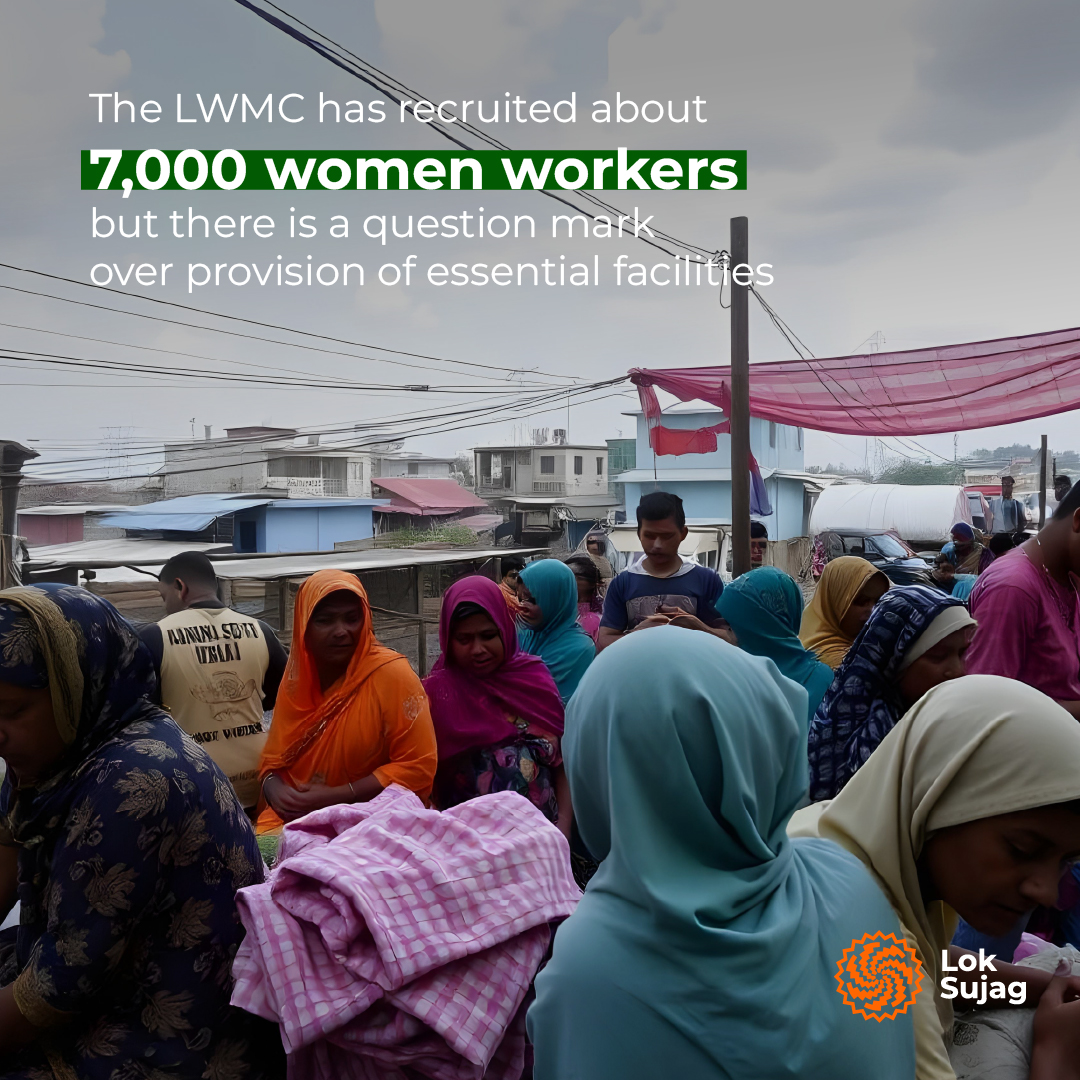
She adds that a woman worker undergoing menstruation or falling ill or having woman-specific needs should be treated fairly.
She says the workers expect the supervisors to communicate to them their work schedules clearly and at least give advance notice before the termination.
The LWMC spokesperson states that there is no formal written policy for the menstrual leave for female workers and it is left to the discretion of the supervisor to grant them time off.
As a result, the women workers are still not granted basic rights like menstrual leave, leaving them at the mercy of their supervisors.
Lack of facilities for the women workers
Another pressing issue raised by the workers is the lack of changing rooms or areas for women.
Nargis explains that when she arrives at work, she and her colleagues often have to find a secluded spot on the road, sometimes behind a car or a corner of the street to change their clothes.
“If they can’t find a private spot, two women will cover an area with a dupatta while another quickly changes clothes behind it. In a country where harassment is so common, this makes us feel very unsafe.”
Nargis complains about the lack of bathroom facility. They often have to seek permission to use the mosque toilets which frequently denied to Christian workers due to the stigma associated with their work and religion.
On the other hand, the Muslim workers often miss their prayers because of the dirty water they are exposed to during work. Not being able to access washrooms to clean themselves and perform ablution also causes them to miss their prayers.
The workers also point out that during the lunch break, the company does not provide them with food. Only those who can afford to buy meals from hotels or dhabas are able to eat while others remain hungry during their shifts.
The lack of gloves as part of safety kits is yet another issue. There have been instances where the workers have also injured their hands because of broken glass pieces in the waste that they have to pick using their bare hands without any gloves.
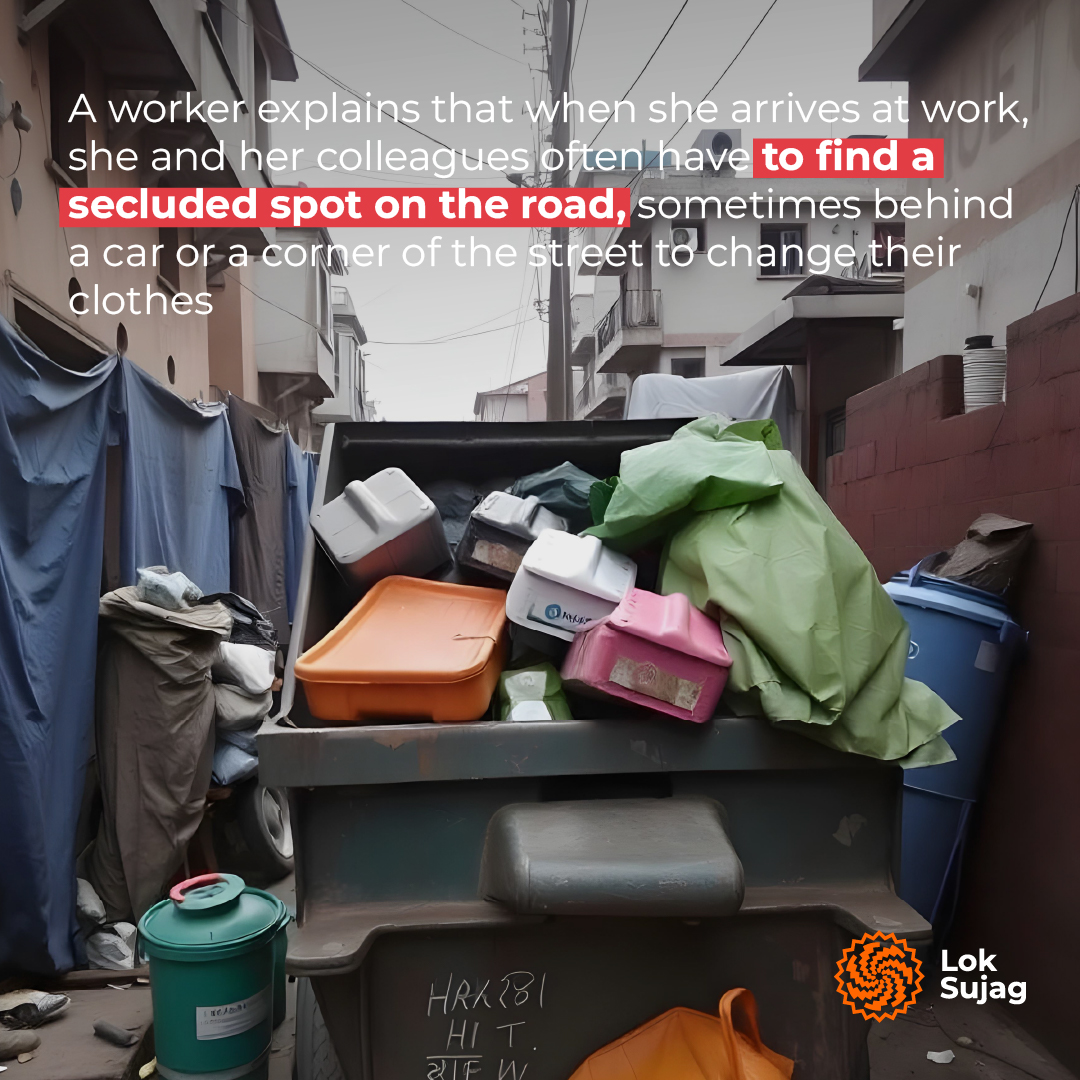
“If a piece of glass cuts our skin, it’s not a concern for the supervisor. We’re just told to wrap the wound up in cloth and keep working,” remarks Naila. She adds that the company does not provide them with shoes or other safety equipment, leading to frequent injuries on the job.
Exposure to hazardous materials
A report by the Pakistan Workers Federation (PWF) says that 93pc of workers at the LWMC acknowledged that they are constantly dealing with dangerous and hazardous materials at the workplace.
It adds that the medical waste from stores and hospitals is particularly injurious to their health and they have to pick up animal carcasses from roads and other public spaces without any safety equipment.
Regarding the health benefits, a worker says they have been given health cards that can be used in government hospitals for any health concern.
Umer Chaudhary, the senior manager communication of the LWMC, says the company only gives the status of a daily wager to the employees but the facilities given to them are those of regular employees.
They have been given facilities such as health check-ups, marriage grants and pensions. The workers, however, told Lok Sujag that the government hospitals can be accessed through their social security cards but they are treated poorly and are not given proper treatment.
The question of harassment
When asked about harassment issue, the workers don’t openly comment on whether they had experienced it at work.
However, they mention that the supervisors sometimes subject them to verbal abuse for being late or seeking leave and even demand personal favors. If a woman expresses that a task is beyond her job description or shows reluctance, the supervisors assign her even more difficult and strenuous work.
Also Read
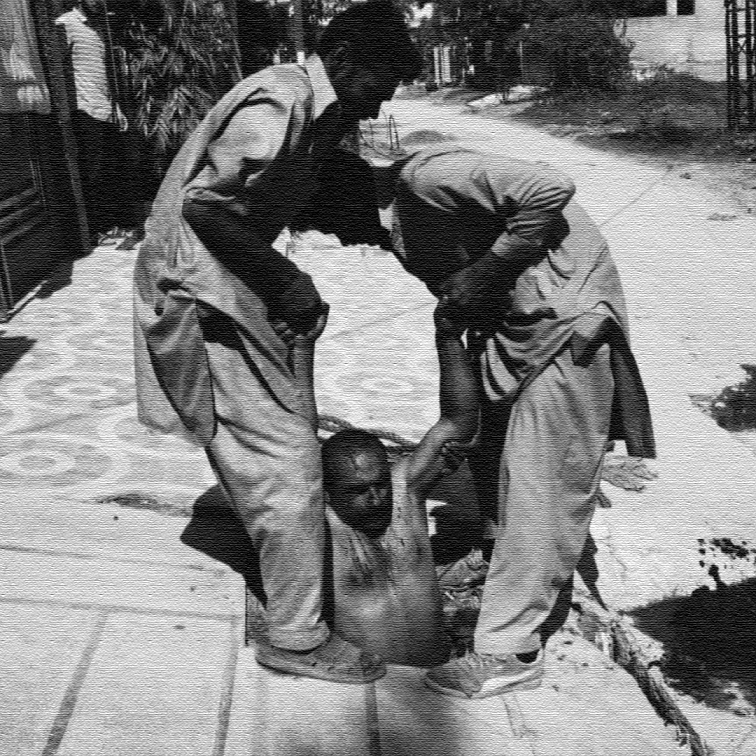
Why Are Sewage Workers Dying Despite Advances in Automatic Machines?
Maryam describes her relationship with her supervisor in these words:
“They often call out to us, saying, ‘Come here, Bibi, work right here’. We have no choice but to comply because if we don’t, they make our jobs more difficult by piling on more work on us and refusing to give us breaks, not even for water or food.
At the end, we have to keep complying, even if the supervisors make us feel uncomfortable or ask us for favours.”
The PWF report highlights various forms of harassment faced by sanitation workers, including verbal and physical abuse, scolding and uncomfortable treatment. These incidents typically come from supervisors, local residents, elected councilors and passers-by in the areas where the workers carry out their duties.
Is LWMC failing its women workforce?
“Whenever we are out working on the roads, we often become targets of the male gaze. However, this isn’t as pressing as my responsibilities at home.
I have to pay the rent and provide for my young children. We are on the roads for these reasons, so we can’t afford to worry about being the subject of men’s attention. We just have to keep sweeping,” says Maryam.
This is the plight of an LWMC worker who still wants to work despite the inequitable nature of the company.
Ms Ayra Patras, in her book, Swept Aside: A Story of Christian Sweepers of Lahore, points out that the sweeper community is deprived of job security, pensions and medical, leading to further alienation along with socioeconomic poverty.
She asserts that in the past, there were more women employed as sanitation workers but the structure of private companies has reduced employment opportunities for women in this field.
The new liberal employment model, intended to address capitalism’s unregulated and harsh conditions for labourers has failed to end the discrimination and exploitation faced by the workforce.
Instead, it has worsened the daily struggles of sanitation workers. If the women workers at the LWMC face so many issues with no redress from the company does it mean it is failing its women workers?
* (Names of workers have been changed to protect their privacy.)
Published on 10 Sep 2024
